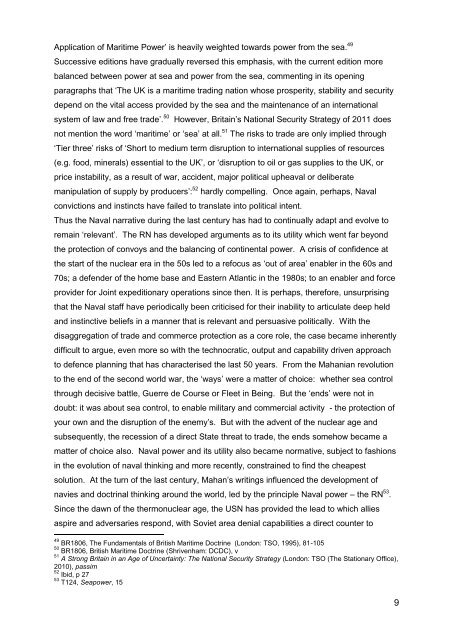90 percent by sea - Defence Academy of the United Kingdom
90 percent by sea - Defence Academy of the United Kingdom
90 percent by sea - Defence Academy of the United Kingdom
Create successful ePaper yourself
Turn your PDF publications into a flip-book with our unique Google optimized e-Paper software.
Application <strong>of</strong> Maritime Power’ is heavily weighted towards power from <strong>the</strong> <strong>sea</strong>. 49<br />
Successive editions have gradually reversed this emphasis, with <strong>the</strong> current edition more<br />
balanced between power at <strong>sea</strong> and power from <strong>the</strong> <strong>sea</strong>, commenting in its opening<br />
paragraphs that ‘The UK is a maritime trading nation whose prosperity, stability and security<br />
depend on <strong>the</strong> vital access provided <strong>by</strong> <strong>the</strong> <strong>sea</strong> and <strong>the</strong> maintenance <strong>of</strong> an international<br />
system <strong>of</strong> law and free trade’. 50<br />
However, Britain’s National Security Strategy <strong>of</strong> 2011 does<br />
not mention <strong>the</strong> word ‘maritime’ or ‘<strong>sea</strong>’ at all. 51 The risks to trade are only implied through<br />
‘Tier three’ risks <strong>of</strong> ‘Short to medium term disruption to international supplies <strong>of</strong> resources<br />
(e.g. food, minerals) essential to <strong>the</strong> UK’, or ‘disruption to oil or gas supplies to <strong>the</strong> UK, or<br />
price instability, as a result <strong>of</strong> war, accident, major political upheaval or deliberate<br />
manipulation <strong>of</strong> supply <strong>by</strong> producers’: 52 hardly compelling. Once again, perhaps, Naval<br />
convictions and instincts have failed to translate into political intent.<br />
Thus <strong>the</strong> Naval narrative during <strong>the</strong> last century has had to continually adapt and evolve to<br />
remain ‘relevant’. The RN has developed arguments as to its utility which went far beyond<br />
<strong>the</strong> protection <strong>of</strong> convoys and <strong>the</strong> balancing <strong>of</strong> continental power. A crisis <strong>of</strong> confidence at<br />
<strong>the</strong> start <strong>of</strong> <strong>the</strong> nuclear era in <strong>the</strong> 50s led to a refocus as ‘out <strong>of</strong> area’ enabler in <strong>the</strong> 60s and<br />
70s; a defender <strong>of</strong> <strong>the</strong> home base and Eastern Atlantic in <strong>the</strong> 1980s; to an enabler and force<br />
provider for Joint expeditionary operations since <strong>the</strong>n. It is perhaps, <strong>the</strong>refore, unsurprising<br />
that <strong>the</strong> Naval staff have periodically been criticised for <strong>the</strong>ir inability to articulate deep held<br />
and instinctive beliefs in a manner that is relevant and persuasive politically. With <strong>the</strong><br />
disaggregation <strong>of</strong> trade and commerce protection as a core role, <strong>the</strong> case became inherently<br />
difficult to argue, even more so with <strong>the</strong> technocratic, output and capability driven approach<br />
to defence planning that has characterised <strong>the</strong> last 50 years. From <strong>the</strong> Mahanian revolution<br />
to <strong>the</strong> end <strong>of</strong> <strong>the</strong> second world war, <strong>the</strong> ‘ways’ were a matter <strong>of</strong> choice: whe<strong>the</strong>r <strong>sea</strong> control<br />
through decisive battle, Guerre de Course or Fleet in Being. But <strong>the</strong> ‘ends’ were not in<br />
doubt: it was about <strong>sea</strong> control, to enable military and commercial activity - <strong>the</strong> protection <strong>of</strong><br />
your own and <strong>the</strong> disruption <strong>of</strong> <strong>the</strong> enemy’s. But with <strong>the</strong> advent <strong>of</strong> <strong>the</strong> nuclear age and<br />
subsequently, <strong>the</strong> recession <strong>of</strong> a direct State threat to trade, <strong>the</strong> ends somehow became a<br />
matter <strong>of</strong> choice also. Naval power and its utility also became normative, subject to fashions<br />
in <strong>the</strong> evolution <strong>of</strong> naval thinking and more recently, constrained to find <strong>the</strong> cheapest<br />
solution. At <strong>the</strong> turn <strong>of</strong> <strong>the</strong> last century, Mahan’s writings influenced <strong>the</strong> development <strong>of</strong><br />
navies and doctrinal thinking around <strong>the</strong> world, led <strong>by</strong> <strong>the</strong> principle Naval power – <strong>the</strong> RN 53 .<br />
Since <strong>the</strong> dawn <strong>of</strong> <strong>the</strong> <strong>the</strong>rmonuclear age, <strong>the</strong> USN has provided <strong>the</strong> lead to which allies<br />
aspire and adversaries respond, with Soviet area denial capabilities a direct counter to<br />
49 BR1806, The Fundamentals <strong>of</strong> British Maritime Doctrine (London: TSO, 1995), 81-105<br />
50 BR1806, British Maritime Doctrine (Shrivenham: DCDC), v<br />
51 A Strong Britain in an Age <strong>of</strong> Uncertainty: The National Security Strategy (London: TSO (The Stationary Office),<br />
2010), passim<br />
52 Ibid, p 27<br />
53 T124, Seapower, 15<br />
9

















